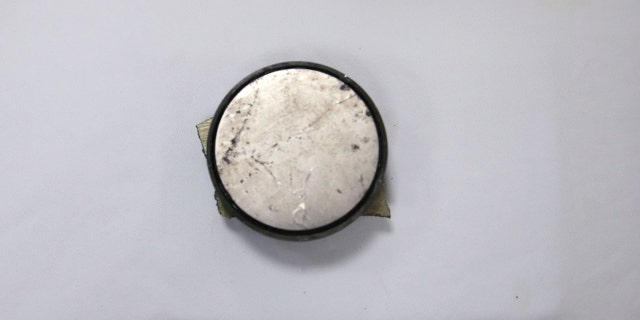
The limpet mine used on a Japanese-owned oil tanker in the Strait of
Hormuz “bears a striking resemblance” to other Iranian mines, U.S. Navy
officials said.
(U.S. Navy)
https://www.foxnews.com/world/limpet-mine-oil-tanker-striking-resemblance-iranian-mines
The limpet mine used on a Japanese-owned oil tanker in the Strait of Hormuz “bears a striking resemblance” to other Iranian mines, U.S. Navy officials said Wednesday.
Cmdr.
Sean Kido of the U.S. Navy’s 5th Fleet claimed Wednesday that the
damage done to the tanker was “not consistent with an external flying
object hitting the ship.”
The
remark contradicts the claim made by the ship’s owner who insisted that
eyewitnesses aboard saw “flying objects” before the attack in the Gulf of Oman.
The
Navy official added that investigators have recovered fingerprints and a
handprint from the side of the ship after the attack.
The revelation follows ever-increasing tensions in the region. The
Iraqi military said three rockets hit an installation north of Baghdad
on Monday that was used by Iraqi troops American trainers.
The
attack on camp Taji, about 17 miles north of Baghdad, was the second on a
military post housing U.S. personnel. An attack on an airbase, also
housing U.S. trainers, north of Baghdad on Saturday caused a small fire.
The U.S. claimed the Iranian regime was responsible for the “blatant
assault” on two oil tankers last week, bringing the Middle East on a
brink of a military conflict.
Secretary of State Mike Pompeo said
Iran’s culpability was based on “intelligence, the weapons used, the
level of expertise needed to execute the operation, recent similar
Iranian attacks on shipping, and the fact that no proxy group operating
in the area has the resources and proficiency to act with such a high
degree of sophistication.”
The so-called limpet mines got the name from the real limpets, small sea snails that easily cling to hard surfaces and rocks.
The
weapon was first developed by the British during World War 2 and is
often used in covert action in order to damage ships because they are
easily attachable.
There are certain variations, with some
detonated by a time fuse while others explode only after the vessel to
which the mine is attached travels a specific distance.
In most cases, the mines are magnetic and are easily attachable to
the hulls of a ship. They normally just disable rather than sink a
vessel.
This wouldn’t be the first time Iran used the mines to
attack oil tankers. In the 1980s, the “Tanker War” erupted in the midst
of the eight-year conflict between Iran and Iraq, threatening to disrupt
the global oil supply.
The U.S. government has been working to provide enough credible
evidence linking Iran with the oil tanker attacks. Pictures of pieces of
a limpet mine were released as part of that effort by the U.S. Navy on
Tuesday.
Last week, U.S. officials released a video last week
supposedly showing Iran’s Revolutionary Guard removing an unexploded
limpet mine from one of the vessels.
The black-and-white footage, as well as still photos released by the
U.S. military’s Central Command on Friday, appeared to show the limpet
mine on the Japanese-owned Kokuka Courageous, before a Revolutionary
Guard patrol boat pulled alongside the ship and removed the mine,
Central Command spokesman Capt. Bill Urban said.
U.S. Central
Command (CENTCOM) also released additional images Monday showing the
aftermath of mine attacks against the oil tankers, including some images
purporting to show Iranian forces removing an unexploded device from
the hull of one of the vessels.
Iranians dismissed the
allegations, with Iranian Defense Minister Gen. Amir Hatami saying they
were unfair and aimed at tarnishing the country’s image.
“The accusation against Iran is totally a lie and I dismiss it firmly.”
“The
accusation against Iran is totally a lie and I dismiss it firmly,” he
said, according to the semi-official Fars news agency on Wednesday.
While
the U.S. claims of Iran’s responsibly are viewed cautiously in Europe,
with Britain being a notable exception, some European countries are
warning that the risk of war cannot be ruled out.
German Foreign
Minister Heiko Maas said the risk of war in the Persian Gulf region is
not ruled out amid the heightened tensions and said the “the situation
is serious” and “everything must be done” to avoid further escalation of
the tensions in the region.
Iran, meanwhile, said Wednesday that
Europe won’t be granted extra time beyond the July 8 deadline to come up
with improvements in the nuclear deal to protect the Iranian economy
amid U.S. sanctions, Reuters reported.
The spokesman for Iran’s Atomic Energy Organization said Iran will
begin enriching uranium to a higher level if Europe did improve the
nuclear accord.
The Associated Press contributed to this report.
No comments:
Post a Comment